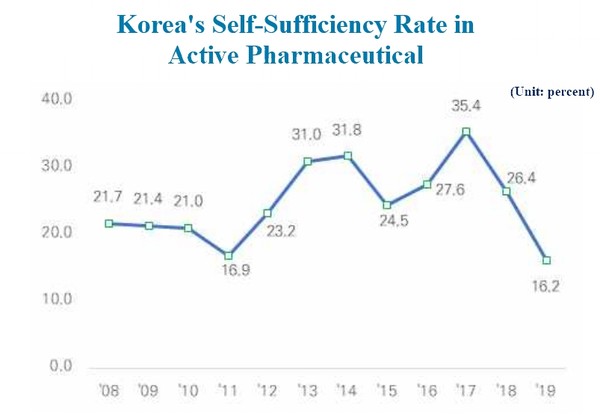Korea’s self-sufficiency ratio of active pharmaceutical ingredients (API) has dropped by more than half over the last few years, as the country increasingly relies on China for drug substances, a report said.
According to the Korea International Trade Association's (KITA) report on changes in the global pharmaceutical supply chain, the country has increasingly depended on imported drug substances due to expanding global supply chain.

Establishing a stable supply of essential medicines has emerged as one of the key tasks for Korea facing drug shortages due to the Covid-19, it said.
The report showed that the self-sufficiency ratio of API fell from 35.4 percent in 2017 to 16.2 percent in 2019, hitting bottom since 2008. In addition, the production of API necessary for manufacturing finished drugs has also steadily declined since 2017.
The self-reliance ratio of finished medicinal products was also on the decline but stayed at a relatively high level of 74.1 percent in 2019, the report said.
Korea relied on China for 36.7 percent of its API supply, revealing vulnerability to supply chain risks. The country also depended on Japan for 13 percent and India for 10.2 percent of API supply, showing problems building a stable self API production.
The country’s output of finished drugs has continued to rise since 2012 to reach 19.8 trillion won ($17.2 billion) in 2019. However, the production of drug substances has decreased since 2017 to remain at 2.5 trillion won.
In a similar vein, the number of API makers had been larger than finished drug makers until 2014, but the situation reversed in 2015.
Korea has registered a yearly growth rate of 14.8 percent in the export of drugs, in both finished and base material forms, since 2018, significantly exceeding the import increase rate of 4.9 percent.
The report said the expanding pharmaceutical market and reorganizing global supply chain after Covid-19 could act as a new opportunity for Korea, which has a massive manufacturing capacity.
It added that Korea needs to manage drug substances with high dependence on a specific country, diversify supply chain, and promote production as increased reliance on China for raw materials is emerging as a risk factor in the global drug supply chain.
"Korea's pharmaceutical production has recorded an average annual growth rate of 7.1 percent since 2016, but the domestic self-sufficiency of raw materials has been rapidly decreasing since 2017," the report said. "So we need to work out measures to secure a stable drug supply chain."
The association added that the domestic drugmakers are lagging in competitiveness compared to global pharmaceutical companies due to the small domestic market, the absence of blockbuster drugs, and the generic-oriented sales structure.

